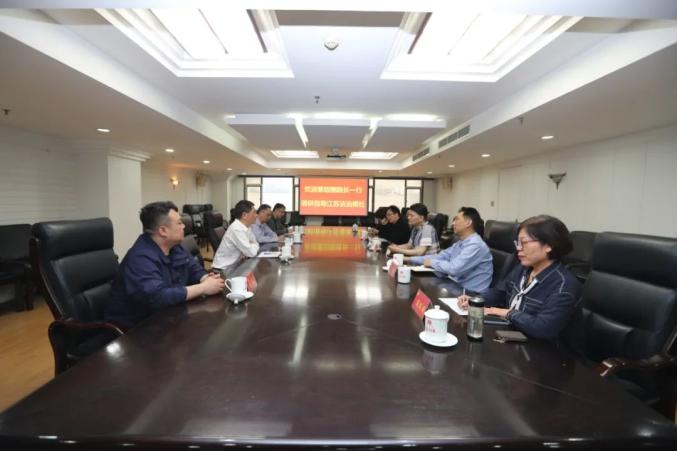Perceive Chinese Culture And Connect Chinese Language
Perceive Chinese Culture And Connect Chinese Language
"I have been learning Chinese in Malaysia since I was a child, but my progress was slow. Later, I decided to participate in the AFS International Cultural Exchange Program and study Chinese in China." Malaysian international student Yu Xihong came to Jiamusi City, Heilongjiang Province for short-term international exchanges by participating in the AFS program.
"I have been learning Chinese in Malaysia since I was a child, but my progress was very slow. Later, I decided to participate in the AFS International Cultural Exchange Program and study Chinese in China." Malaysian international student Yu Xihong came to Jiamusi City, Heilongjiang Province for short-term international exchanges by participating in the AFS program. The school and the reception family enthusiastically helped him, which made his Chinese level significantly improve.
The AFS International Cultural Exchange Project is jointly established by the China Education International Exchange Association and the International Cultural Exchange Organization. It is an exchange project for middle school students. This program helps many students understand China and improve their Chinese skills. Yu Jia, former head of the Foreign Affairs Department of the Education Bureau of Jiamusi City, Heilongjiang Province, believes that Jiamusi has a distinct regional culture and residents are generous, straightforward, and hospitality, providing unique conditions for carrying out AFS projects.
Deeply cultivate the fertile soil of culture and sow Chinese seeds
Speaking of international students who have taught, Sun Qi, a teacher at Tangyuan County High School in Heilongjiang Province, knows it carefully: "Tang Shenghao from Italy passed the CET-6 of the Chinese Proficiency Test (hereinafter referred to as 'HSK'), and later went to Beijing Language and Culture University to study for a graduate degree. Xu Wensi, a Thai student studying at Xiamen University, also passed the HSK CET-6."
According to previous years' results, among the international students trained by the AFS program and passed the HSK, Jiamusi City, Heilongjiang Province achieved remarkable results. "Chinese is one of the most difficult languages to learn in the world." Li Hongli, a Thai student who once studied at Jiamusi No. 8 Middle School, sighed when she recalled her experience in Chinese learning in Jiamusi.
It is understood that although the AFS project has a unified work guidance manual and teaching guidance syllabus, there is no specific educational content. Over the years, Jiamusi City has made in-depth exploration and established a characteristic teaching system.
Zhao Chunxue, a teacher at Jiamusi No. 1 Middle School, offers Chinese calligraphy, painting and paper-cutting art classes for international students. She said: "International students start by understanding the tools of brush and ink and mastering the posture of holding the pen, and feel the artistic charm and cultural connotation of Chinese calligraphy."
Heilongjiang Forestry Health School has set up a "Chinese Day" event for international students to experience Chinese culture, and has specially arranged courses such as painting, calligraphy, sports, music and traditional Chinese medicine nursing for them. School teacher Zhao Liwei once participated in the recording of traditional Chinese medicine teaching videos of the "Belt and Road Initiative·Same Class" and is now responsible for teaching Chinese medicine nursing courses for international students. "By learning Chinese culture, students' vocabulary has been accumulated continuously, Chinese medicine knowledge has become increasingly rich, and their Chinese language level has been significantly improved," she said.
Immerse your family life and feel the warmth of China
International students participating in the AFS program need to board in Chinese families and understand China and Chinese culture in a full Chinese environment. This boarding model allows international students to experience the care of Chinese parents.
Zhou Jingya, a German student studying in Nankai University, studied at Jiamusi No. 11 Middle School from 2015 to 2016. In her eyes, Chinese parents pay great attention to cultivating good living habits in their children. But different habits also bring some "embarrassment". Liu Zhonghui and his family applied to become an AFS program hosting family and received an Australian student. He said: "Once I entered the room without knocking on the door. She was very unhappy at the time. I think these children are used to having their own space, and I should respect her." Later, he developed the habit of knocking on the door first when entering the room and asking for the other party's opinions in advance.
Staying together day and night has allowed these people from different cultural backgrounds to forge a deep friendship. "My famous Chinese studies were taken by Chinese mothers." Mao Mao, a Thai student who had studied at Jiamusi No. 8 Middle School, said, "Chinese mothers arrange activities every week and teach me to cook home cooking. Chinese father said that my mother started to learn how to cook for me." Liu Zhonghui said, "Before the child returned to China, our family and friends gave her many gifts, including tea, tea sets, clothes, food, etc. She was afraid that her luggage would be overweight, so she put the clothes on her body layer by layer, put the tea set in her pocket, and she didn't want to throw anything away. On the day she returned to China, she dressed like a 'little ball'."
During this period, international students have a deeper understanding of China. Li Hongli said: "I found that Chinese people are very open and willing to understand the cultures of different countries and be willing to communicate sincerely with foreigners."
Cultivate friendly messengers and build a bridge of communication
After coming to China, Chinese people and Chinese culture have become hot topics for these international students. During his study in China, Yu Xihong often shared his experiences and experiences in China with his Malaysian family and friends, and traveling to China has become their eager wish.
After graduation, most international students participating in the program choose to go to college in China or return to China to work related to Chinese. A Thai student in the first international student class of Heilongjiang Forestry Health School passed the HSK CET-6 test while he was in school and became a Chinese teacher after graduation. A student she taught later signed up for the AFS program to study in the school's fourth international student class. It is her Chinese story that ignits students' yearning for China. After graduation, Li Hongli returned to China to work in translation and translated Chinese novels into Thai. She said: "Studying in China has changed my life and has given me more choices and possibilities."
According to statistics, over the past 30 years, Jiamusi City has received 520 students from 27 countries through the AFS project, 603 volunteer families participated in the reception, 210 teachers were selected to work, exchange and study abroad, and 75 high school students have visited 15 countries to participate in international cultural exchanges. "The AFS project promotes the integration, understanding and communication of the world," said Yu Jia.
"China Education Daily" June 12, 2025, Page 09, 2025





